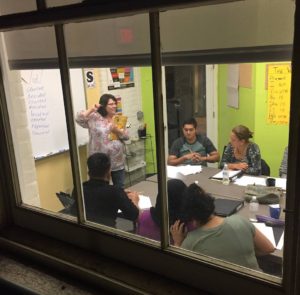What is academic English?

Tongue-twisting vocabulary? Brain-busting grammar? Sleep-inducing texts?
Not at all.
Academic English needs only to be clear, concise, and compelling. Simply put, English for Academic Purposes (EAP) begins and ends with precise and concise communication. You don’t want your readers scratching their heads or scrambling for the back button on their browsers. You want their eyes glued to the page and their heads nodding along in understanding.
To catch and hold your audience, try this: KISS: Keep It Specific and Short (and Simple). KISS means the best word, not the hardest word. KISS means easy-to-follow organization, not complicated structures. KISS means expressing ideas, not impressing the reader. KISS goes with EAP like chocolate and ice cream.
Let’s dig deeper. Consider three main aspects of EAP:
- Information is objective and evidence-based.
- Form is organized and formatted.
- Style is precise and concise.

Information refers to not only the content but also your purpose. Your purpose may be to persuade the reader, define a term, classify types, predict effects, explore differences, present research–or a combination of more than one.
The information you present must be objective, which means based on data, facts, records, and other verifiable sources, while your ideas must be supported by evidence, examples, and logical arguments.
For instance, take the topic of the American Revolution and the Boston Tea Party in Boston, Massachusetts in 1773. The specifics of your essay or presentation assignment will depend on the class, but a range of options are available.
You might compare the Boston rebellion to an independence movement in your country. You might analyze multiple history texts to discover three surprising causes. You might argue that New England colonial politics involved three principles that still affect international relations today.
In all three cases, your job is to do a lot of research. Then you choose and organize the best evidence to support your conclusions.
This support may consist of paraphrasing, which means summarizing somebody else’s ideas in your own words, and direct quotes, which means putting the exact words of another person in quotation marks. Be sure to include references that cite the sources of your evidence so that you avoid plagiarism.
Form means organization, structure and formatting. In the USA, academic writing tends to be linear, which means to go in a straight line. A linear argument goes logically from point A to point B to point C without taking detours or spinning in circles.
In other words, academic writing follows a map so that the reader doesn’t get lost, like taking a plane directly to Boston instead of flying around and stopping in random places around New England.
A well-organized essay or presentation does not repeat or ramble (go all over the place). A typical structure begins with an introduction with a thesis statement or main idea, continues with several body paragraphs organized around specific points, and finishes with a memorable conclusion.
Formatting refers to how your writing looks on the page, including font, margins, and footnotes. An important aspect of formatting concerns citations. You need to report exactly where you got your information and who wrote the texts you used.

The way you cite sources depends on the field, but the most common styles in college are Chicago, APA, and MLA. The APA (American Psychological Association) style is commonly used in psychology, education, and other social sciences. The MLA (Modern Language Association) style is typically used for humanities fields such as English studies, literature students, and cultural studies. Chicago notes and bibliography is used in history and Chicago author-date is used in the sciences. Your professors will tell you which they prefer and expect you to follow the rules to perfection. You don’t need to memorize the rules; when it’s time to cite your sources, you can either check or reference or use an online tool such as the MLA citation generator. If you don’t properly cite your sources, you will be committing plagiarism, which can lead to severe consequences such as failing the class or expulsion from school. Big trouble!
Style means the way you write–not what you say, but how you say it. To write academically, you don’t have to use a lot of fancy vocabulary; instead you choose a few clear and direct words. You don’t use the biggest word to sound smart, but the best word to express the idea.
Yes, academic writing has a formal tone. You don’t use the language of text messages or chats. No LOL, omigod, or !!!!!!. No slang, explosive emotions, and unfinished sentences. However, formal does NOT mean wordy, stiff, and pretentious. Rather, it goes straight to the point, illustrates with specifics, and supports with evidence.
Why does clear communication matter? You can change hearts and minds. You can grow relationships and experience new cultures.
Not only do Academic English skills open doors at school or work. EAP can also enrich your daily life and superpower your personal growth. Whether studying in Boston, Massachusetts or traveling around New England, you can build professional relationships, grow your knowledge, and develop intercultural understanding. By sharpening your pen, you hone your mind.
Academic English for University and College entrance
Whether aiming for Harvard, UMASS Boston, or a New England community college, you need training in academic English. You need EAP not just to move to the head of the class, but even to walk in the door.
That’s because no university will admit a student who does not deliver a great application essay.
During the admissions process, you will be asked to write about yourself: your experiences, your goals, your defining traits, your values.

Your first and best–and maybe last–chance to show off your academic English skills is not when you proudly thrust a term paper into the hands of your professor, but when you confidently click the send button on your university application.
To wow the school, your essay must focus on one idea and make the specifics crystal clear. You aren’t painting a vast landscape of your entire life. You’re painting a self-portrait with a few key details.
Admissions officers read your essay to understand you, the human being behind the transcripts, test scores, and biographical data. You must reveal your unique qualities, traits, and values as an individual. EAP writing techniques can help you stand out as your authentic, amazing self.
Pro tip#1: Begin with an irresistible hook
Your essay must begin with a hook to grab the reader’s interest. There are many techniques:
- Set a scene with images or dialogue, like the first moments of a movie.
- Tell a quick anecdote.
- Ask a fascinating question.
- Short punchy statement, definition, detail, contradiction, advice, dilemma, statistic, metaphor, claim, or paradox.
Here are some examples of an impactful first sentence. Note the visual details, the punchy verbs, and the elements of surprise.
To hook a reader into a story about a game:
- For a moment the battered yellow ball hangs in the air as my heart pounds.
To hook a reader into a story about leaving home for college:
- I grabbed the shiny new license into my pocket, jumped into my rusty Honda, and raced down the gravel road towards Boston.
To hook a reader into a story about a conflict:
- The crisis in my school began over a pack of gum.
Check out these hooks that use a paradox, which is statement that appears logical but contradicts itself:
- I see the world clearly only when I close my eyes.
- I discovered the best way to work hard was to be lazy.
- The only way to make money is to spend it.
- By waging war, we kept the peace.
- My greatest success turned out to be a failure.
Do you have a poetic touch? Try figurative language, such as a metaphor or simile.
- The snow tucked around the barn like a white blanket. (The sentence uses a simile, comparing the snow to a blanket with the word “like.” )
- The children gazed into the moonlit mirror of the lake. (The sentence uses a metaphor, comparing the lake to a mirror but without the word “like.”)
The only limit is your imagination. Be bold and creative with your hook, and you’ll immediately capture the reader. By joining an academic English course, you can try out different literary approaches to see which one fits you like a glove (see, that’s a simile!)
Pro Tip #2: Connotation Inspiration
Your college essay should speak from the heart. This means your word choice should evoke emotions and reactions.

To express yourself with the right feel, you must develop an ear for the connotations of a word.
The connotation is the feeling or idea associated with a word. Connotation adds implicit emotional, cultural, and contextual meaning to its explicit definition. You don’t truly understand a word until you appreciate both its definition and connotation.
The most common connotations are positive or negative. A word with a positive connotation would be used to praise, whereas a word with a negative connotation would be used to criticize.
For instance, consider two adjectives: obstinate and resolute. Both words are similar to stubborn–when you won’t change your mind and you won’t quit. However, obstinate has a negative connotation, while resolute has a positive connotation.
In other words, being obstinate is a bad thing, while being resolute is a good thing—even though both words describe the same basic quality. Thus, when describing people who don’t give up and don’t back down, you may choose obstinate or resolute depending on your attitude towards them. When praising heroes, you would describe them as resolute (or determined, or tenacious, or another word with a positive connotation). In contrast, when condemning bad guys, you might describe them as obstinate (or pig-headed, or disagreeable, or another word with a negative connotation).
Here’s an example you might use in an essay when applying to a college in Massachusetts or New England, USA. Let’s say you want to describe Boston as a busy city, but you know busy is a boring adjective. Two expressive adjectives connected to the idea of being busy are hectic and bustling. Describing Boston as hectic would connote stress (negative), whereas calling Boston bustling would connote excitement (positive). Hectic might fit a story about feeling stressed, while bustling might enhance a tale of becoming excited. Both words make a greater storytelling impact than the bland word busy.
How do you gain insight into connotations? The short-term solution is to dig deep into dictionaries and thesaurus entries to excavate clues. Dictionaries will mention connotations and demonstrate the use of the word in example sentences.
The long-term solution is to read widely and freely. Great writers are also great readers. Just like you can’t learn the violin without listening to string music in performance, you can’t write English without reading the language in action. You get a feel for the subtleties of words by seeing them being used, just like you gain appreciation of the subtleties of a musical composition by hearing instruments being played.
When reading articles, stories, and books, you see—and remember—the evocative language authors choose to convey emotions, moods, and secondary meanings. Only by reading English do you experience words in meaningful and memorable contexts.
If that sounds overwhelming–don’t despair! You can draw the water of inspiration from two wells.
First, there are vast resources of written English from which to choose. It doesn’t matter what you read, as long as you enjoy yourself. Whether you’re interested in science fiction, cooking, or local history, feel free to download a Kindle book, grab a slim book off a shelf, scroll through a web article, or flip through a magazine—just make sure the level of English feels comfortable so that you don’t scramble for your translator. Train yourself to think in English by examining vocabulary in context for both the definition connotation.
Secondly, remember this is not a new vocabulary skill, but rather a refinement of a basic skill.
You’re already a connotation pro thanks to your ongoing career as an English student.
For example, you already know from past English lessons that these two sentences describe the same basic action:
- I went to my house = I went home.
Whether or not you’re consciously aware of connotations, on some level you already intuitively grasp the difference between a house and a home. That is, a house is just a building, but a “home” is a place that suggests comfort, warmth, and love. That’s why when you miss your country, you don’t get “housesick”—that’s not even a real word—but you do get “homesick.”
Your skill with choosing words by connotation will make your writing stand out. Your college essay tells the story of you, and your choice of words should express your identity, values, and personality. EAP is not about formal vocabulary, but rather careful word choice.
Do you need Academic English to go to University?
To enter, graduate, and benefit from US university, you need academic writing skills. From top universities in Massachusetts to accessible community colleges around New England, admissions offices want to know more than the who and what. They want to know the how and why.
They want to hear your story. But the story must be told with focus and flair.

Maybe you dream of strolling through the halls of a top-ranked US university in New England. Maybe you hope to earn an MBA at a business school in Boston. Maybe your goal is to hack the IOT at a Massachusetts engineering firm. No matter your dreams, you need academic English.
Effective written and spoken communication is essential in any academic or professional realm. English for Academic Purposes (EAP) requires language that is clear, objective, and well-organized.
Here are three essential reasons you need academic English for university.
#1 To get into a school
To stand out from the crowd, you need an application essay that rises to the occasion.
The college admissions process is not just about displaying your grades and scores, but revealing your values and goals. Besides the interview, the main way you introduce yourself is through the application essay. In fact, when a school must decide among equally impressive candidates, the essay may be the deciding factor.
The essay can make or break your dreams.
With the essay, you open a window into your world. The window reveals your point of view, your insights into yesterday, your vision of the future.
Key aspects of academic writing–concrete language, active verbs, fact-based objectivity–pertain to the creation of a powerful application essay. Colleges want to see you build a logical argument with supporting evidence (facts!), memorable description (the 5 senses!), and original insights (your POV: Point of View.)
Can you engage the reader with a compelling hook?
- The battle began over a pack of chewing gum.
Can you describe an event vividly?
- My heart pounded as the battered purple ball flew over the rusty fence.
Can you probe a mundane experience for surprising insights?
- While browsing the racks of discounted coats in a Western Massachusetts shopping mall, I suddenly saw a connection between Black Friday sales in 2020 and the American Revolution in 1776.
Besides language skills, the essay showcases your analytical skills–the way you think, question, and delve into topics of substance and personal interest. Does your essay show awareness of contemporary issues and important questions? Does your writing show self-awareness? Are your personal traits and values a good fit for the school?
Your essay paints a self-portrait. Without the ability to write concise, precise, and engaging English in your own distinctive voice, your picture may get lost in the shuffle.
#2 To thrive in your academic courses
You won’t get an “A” in your college courses unless you can excel at the US academic writing style. To thrive, you need to cultivate both substance and style to make your points with pizazz.
The US academic environment has a culture. Just like popular culture varies among countries, so does the academic culture differ among educational systems.

The US educational system is student-centered, not instructor-driven. Unlike some other systems, US academic culture does not value standardized exams, extensive lecturing, and rote memorization. On the contrary, the US academic system revolves around original writing, active classroom participation, and critical thinking.
In a student-centered environment, you are expected to write extensively on a range of topics in a variety of formats. This is how you demonstrate understanding, show progress, and take responsibility for choosing your learning.
Consider all these ways you may write. You may keep a journal in which you record reactions to assigned readings. You may participate in online discussions in which you respond to peers informally but with academic rigor. You may participate in peer review in which you exchange feedback on the work of your classmates. You may collaborate with a team on a project in which you produce a report. You may take exams in which you write brief but detailed short answers. You may write 3-page book reports, 5-page persuasive essays, or 10-page research papers. Your program may require a final written thesis or dissertation.
All this written work entails mastery of academic writing fundamentals: clear prose, purpose, organization, and supporting evidence.
#3 To benefit from your program
Have you ever read a book and then a month later struggle to recall important points? Writing about texts engages your memory.
Have you ever had trouble piecing together the argument of an article? Writing helps you organize your understanding.
Have you ever had to collaborate and share feedback with a team? Writing helps you hone ideas, exchange insights, and build consensus among peers.
A well-wrought essay reflects a well-thought process. To write means to clarify your own thoughts, organize ideas, hone arguments, and understand data. And sharp critical thinking skills allow you to interpret materials in your courses.
You aim higher than merely passing a course or barely earning a degree. You want to excel, gain mastery of skills, and grow. Academic writing paves a road to succeeding, not just squeaking by.
With weak writing skills, you won’t be able to complete coursework, contribute to group projects, and build knowledge. But with strong writing skills, your investment of time and money in a US university will pay off.

And as you begin your job search, you’ll be able to craft effective cover letters, emails, and elevator pitches. On the job, you may have to compose reports, projects, and online content. Your EAP writing skills will continue paying dividends.
The best way to cultivate EAP is by taking an in-person or online academic English writing course. You can superpower your prose with new techniques and strategies. You can master the writing process from brainstorming to outlining to drafting to revising to editing to proofreading to citing sources. Under the guidance of an instructor and in collaboration with peers, you can avoid academic culture shock. By investing in an academic writing course, you’ll equip yourself with tools to craft winning essays.
Watching TV, using social media, and listening to music may help develop conversational English, but only by participating in a real-world academic writing course can you acquire the appropriate vocabulary, grammar, and structure for higher education in the USA.
How EAP can help boost your job prospects?
When job opportunities call, will you be ready with an answer? And will your answer lead to open doors, or will you hit roadblocks?
Employers in the USA seek candidates who possess more than just hard skills, such as technology skills, certifications, and resume bullet points. Indeed, when selecting equally qualified candidates, US companies value soft skills such as interpersonal skills, emotional intelligence, and creative problem solving.
Foremost among soft skills are communication skills. This includes contributing to meetings, presenting to a team, and composing emails, reports, and proposals. And that means WRITING.
No matter the position, field, or company, without strong writing skills a candidate will struggle to find a position, advance towards leadership roles, and seize better opportunities. The fundamentals of EAP, such as essay structure and concise language, likewise serve as the fundamentals of business writing.
Here are three ways writing skills translate on-paper potential into on-the-ground wins.
Business degrees require writing

Time is money. When you write, you need to get straight to the point, like an arrow flying towards the bullseye.
From market analysis to legal briefs, the business world is flooded by seas of paperwork. You must be able to skim, analyze, and produce proposals, memos, company letters, instruction manuals, financial reports, case studies, meeting minutes, and internal documents. And do it fast.
For this reason, MBA programs require extensive writing. From the initial personal statement through mid-term exams to the final thesis, you’re expected to write with breadth and depth but also with straightforward wording and easy-to-follow structure.
MBA writing involves the standard EAP elements of appropriate format (introduction, body paragraphs, conclusion), content (objective, factual, evidence-based), and style (concision, clarity, accuracy).
While earning a business degree you may write a variety of essays, the same as you would in a liberal arts program. You may write a case study in which you investigate a company’s success or failure. You may write a narrative essay in which you tell a story with a theme and details. You may write a persuasive essay in which you advance an opinion with a fact-based argument. You may write an expository essay in which you explore–or “expose”–topics in order to enlighten, inform, or instruct. Other essay types include the compare/contrast, the cause/effect, or research paper.
In all cases you will follow proper citation guidelines to show your sources and avoid plagiarism.
The job search calls for cover letters, LinkedIn, and emails
While the eventual in-person job interview can make or break your job prospects, the initial points of contact between you and your future employer exist in the realm of the written word.

You continually craft your LinkedIn profile, tweaking your summary, polishing your personal statement, and inventing snazzy phrases. Cultivating career opportunities, you write first contact emails, follow up emails, and thank you emails. You email colleagues, professors, human resources departments, and professional networking contacts. You write cover letters to accompany your resume when applying for a position.
To write effectively, you employ EAP tools: dynamic verbs, concise phrases, and professional but friendly expressions. You revise tirelessly, edit ruthlessly, and proofread meticulously.
A single typo like a torpedo can sink your ship. Conversely, a well-crafted email can build a bridge between you and a professional contact.
Work responsibilities include writing
To succeed professionally, you need a writing toolbox. EAP provides the tools you need.
English for academic purposes is defined by the ability to address an audience of educated non-specialists. That means you assume that your reader brings a base of broad knowledge but lacks expertise in your specific field.
Imagine explaining a complicated project to a client. The client is smart and educated, but not an expert like you. Can you communicate the necessary points in plain, understandable language?
Interestingly, technical job interviews sometimes include questions in which the candidate demonstrates communication skills by working through common-sense and critical thinking challenges such as:
- How would you explain the Internet to a six-year-old?
- How would you explain a complicated technical problem to a colleague with less technical understanding?
- How would you calculate the number of basketballs that can fit in an airplane?
Your job in answering the question is not to get the right answer, but to think out loud clearly, carefully, and creatively. You can’t do this without EAP skills such as avoiding jargon, using active verbs, and making concise sentences (KISS). You may also employ literary tools such as metaphors, similes, and figurative language.
For instance, you could explain the Internet to a six-year-old by comparing it to a system of pipes that carries water to billions of sinks. The wires of the Internet are like pipes that go all over the world, the constantly flowing information is like water, and your computer devices are like faucets that you turn on and off whenever you’re thirsty for information!

Once you’re on the job, you’ll be writing for an audience of both clients and colleagues. You may draft content for your company’s web site, summarize a financial statement, or perfect a product proposal.
Common English mistakes include using too much passive voice and not enough active verbs, cluttering the prose with filler words and jargon, and misusing punctuation such as commas and colons.
How can you avoid these mistakes and embrace your strengths? Join an academic English course today. Your educational and professional goals are within reach.
The good news is that English for Academic Purposes (EAP) does not need to be boring, fancy, or complicated. The even better news is that an academic English course can also be fun, interesting, and culturally enriching. In fact, building EAP skills not only opens opportunities for school and work but also improves practical communication skills for a more fulfilling and rewarding life.
Related Articles
- Take an English course in USA
- How to improve your academic and business English writing skills
- Why 2021 has skyrocketed the importance of improving your English communication skills for the workplace?
- What is the difference between social and academic English, Part 1
- What is the difference between social and academic English, Part 2
- Top movies to help you learn English and love the language more
Chris Elliott is ESOL instructor and Academic Coordinator at the International Language Institute of Massachusetts, two hours west of Boston in Massachusetts, New England, USA. ILI offers a range of programs, including an online and in-person Intensive English Program and part-time Academic Writing and Job Interview courses. ILI provides a safe, friendly and inclusive environment where all are welcome.